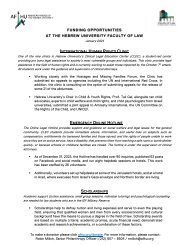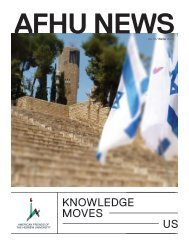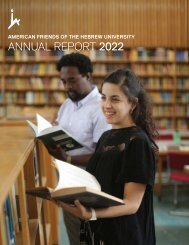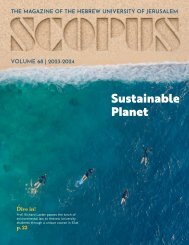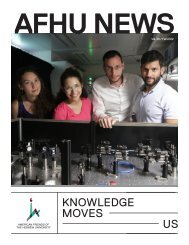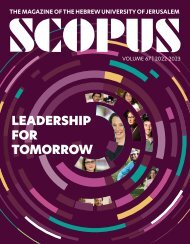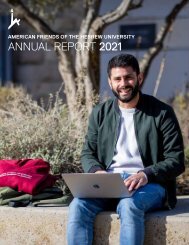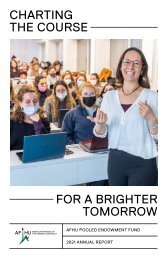You also want an ePaper? Increase the reach of your titles
YUMPU automatically turns print PDFs into web optimized ePapers that Google loves.
Spotlight<br />
Partnership<br />
ISEF: CELEBRATING 40 YEARS<br />
OF BRINGING HIGHER EDUCATION TO<br />
ISRAEL’S UNDERPRIVILEGED STUDENTS<br />
After 40 years at the helm of the<br />
ISEF Foundation, Nina Weiner<br />
continues to be inspired by her<br />
lifelong drive to ensure that Israel’s<br />
underprivileged children receive a<br />
higher education. Founded from a deep<br />
moral imperative to eliminate injustice,<br />
ISEF creates opportunities through<br />
scholarships, social advocacy and<br />
leadership training for young Israelis<br />
from under-served and immigrant<br />
communities to earn degrees from<br />
undergraduate through a post-doc.<br />
Today the organization also actively<br />
counters Israel’s brain drain.<br />
Born in Egypt to Israeli parents,<br />
Weiner returned to Israel with her<br />
family at the onset of the State in<br />
1948. Although Weiner’s family had<br />
accommodations with other family<br />
members, many immigrants from<br />
North Africa and the Middle East<br />
who arrived in the same period often<br />
landed in the harsh conditions of the<br />
Ma’abarot (temporary housing set up<br />
for their absorption). It was on a visit<br />
to these absorption sites during the<br />
mid 1950s, as a member of a European<br />
research team, that Weiner first<br />
encountered North African and Middle<br />
Eastern refugee children. “My heart<br />
went out to them. I knew that because<br />
of negative stereotypes and their much<br />
lower socio-economic status, they were<br />
ill-equipped to assimilate into Israel’s<br />
economic and social mainstream.”<br />
It was in the 1970s, however, when<br />
she again witnessed the deplorable<br />
conditions and the “ethnic gap” in<br />
Israel’s development towns, that she<br />
knew “we could no longer tolerate a<br />
situation where we have two kinds<br />
of Jewish children in Israel,” she<br />
explained. “We needed to find a way to<br />
bring equality to the situation.”<br />
With some luck, she was introduced<br />
to the late Lebanese-born Jewish<br />
banker, Edmond J. Safra, and his wife,<br />
Lily Safra, and with their support,<br />
ISEF was born in 1977. The three<br />
founders strongly believed that the key<br />
to renewal lay in developing Israel’s<br />
intellectual capital rather than projects<br />
which sought to physically rehabilitate<br />
Israel’s poorest peripheral areas.<br />
The Safras and Weiner together<br />
dreamed of narrowing Israel’s socioeconomic<br />
gap by providing higher<br />
education to gifted students from<br />
disadvantaged backgrounds. Moreover,<br />
they believed that empowering<br />
students through high academic<br />
expectations, and through leadership<br />
and social advocacy training, would<br />
Nina Weiner (bottom row, 2nd from the left) and Lily Safra (bottom row,<br />
far right) with ISEF International Fellows at a benefit gala in New York<br />
have reverberating effects.<br />
Lily Safra, today the Honorary<br />
Chairwoman of the foundation and a<br />
great humanitarian in her own right,<br />
has continued her generous support of<br />
ISEF since she helped to co-found it.<br />
The 400 students who receive<br />
scholarships from ISEF annually<br />
are also required to donate time to<br />
their communities each week and<br />
to undergo leadership training. It<br />
is a methodology that has yielded<br />
staggering success. Since 1977, ISEF<br />
has granted more than 20,000 annual<br />
scholarships to students living in<br />
Israel’s poorest regions and enabled<br />
more than 6,000 young Israelis to earn<br />
degrees from Bachelor’s to PhD, often<br />
in prestigious programs overseas. They<br />
return to Israel and become leaders in<br />
government and medicine, academia<br />
and technology.<br />
To ensure that Israel benefits from<br />
With reporting by Helena Flusfleder<br />
<strong>2017</strong>-2018<br />
22




